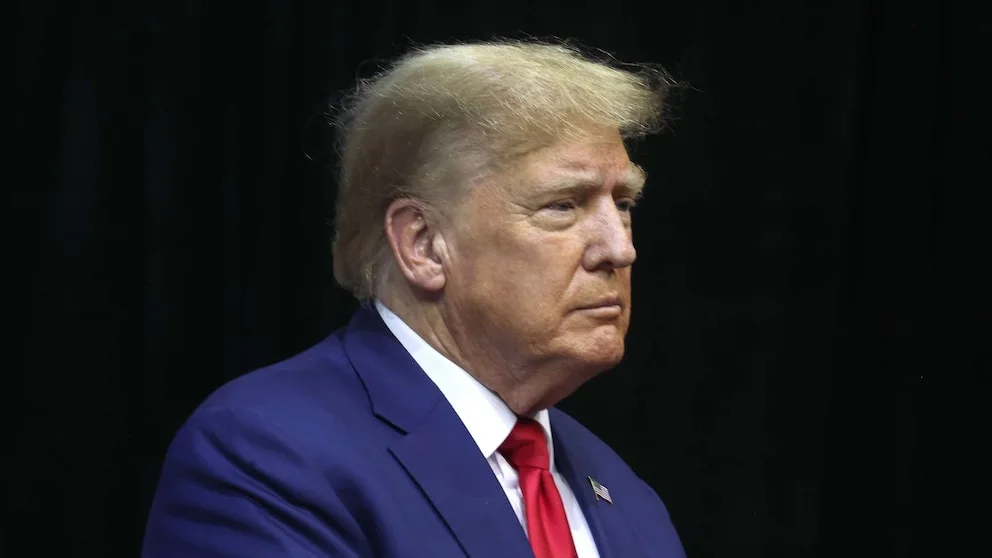One of former President Donald Trump’s long-time assistants told federal investigators that Trump repeatedly wrote to-do lists for her on documents from the White House that were marked classified, according to sources familiar with her statements.
As described to ABC News, the aide, Molly Michael, told investigators that – more than once – she received requests or taskings from Trump that were written on the back of notecards, and she later recognized those notecards as sensitive White House materials – with visible classification markings – used to brief Trump while he was still in office about phone calls with foreign leaders or other international-related matters.
The notecards with classification markings were at Trump’s Mar-a-Lago estate when FBI agents searched the property on Aug. 8, 2022 – but the materials were not taken by the FBI, according to sources familiar with what Michael told investigators.
When Michael, who was not present for the search, returned to Mar-a-Lago the next day to clean up her office space, she found the documents underneath a drawer organizer and helped transfer them to the FBI that same day, sources told ABC News.
The sources said Michael also told federal investigators that last year she grew increasingly concerned with how Trump handled recurring requests from the National Archives for the return of all government documents being kept in boxes at Mar-a-Lago – and she felt that Trump’s claims about it at the time would be easy to disprove, according to the sources.
Sources said that after Trump heard the FBI wanted to interview Michael last year, Trump allegedly told her, “You don’t know anything about the boxes.”
It’s unclear exactly what he meant by that.
Trump pleaded not guilty in June to 37 criminal counts related to his handling of classified materials, after prosecutors said he repeatedly refused to return hundreds of documents containing classified information ranging from U.S. nuclear secrets to the nation’s defense capabilities, and took steps to thwart the government’s efforts to get the documents back. Trump has denied all charges and denounced the probe as a political witch hunt.
As ABC News previously reported, Michael is believed to be the person identified in special counsel Jack Smith’s indictment as “Trump Employee 2,” described in the indictment as someone who handled many of Trump’s White House-era boxes at Mar-a-Lago and who provided Trump with photos of those boxes that were then included in the indictment.
Michael’s statements to investigators, described to ABC News by sources, shed further light on the breadth of evidence that Smith has amassed to support his case against Trump.
A Trump spokesperson said that what ABC News was told – through what the spokesperson called “illegal leaks” – lacks “proper context and relevant information,” and that “President Trump did nothing wrong, has always insisted on truth and transparency, and acted in a proper manner, according to the law.”
A representative for Michael declined to comment to ABC News. The FBI also declined to comment.
‘Easily’ disproven In 2018, Michael became Trump’s executive assistant in the White House, and she continued to work for him when Trump left office. But she resigned last year, in the wake of Trump’s alleged refusal to comply with the federal requests and the FBI’s subsequent search of Mar-a-Lago.
Speaking to federal investigators, Michael recounted how, by late 2021, as many as 90 boxes of materials from Trump’s time as president were moved into a basement storage room at Mar-a-Lago, and how – as pressure from the National Archives mounted – she and Trump aide Walt Nauta would bring boxes to Trump’s residence for him to review.
Trump eventually agreed to turn over 15 boxes of materials, which Michael told investigators she viewed as a positive sign, sources told ABC News.
But then, according to what she told investigators, around the same time that the National Archives found nearly 200 classified documents in the 15 boxes and referred the matter to the FBI, Trump began to seem more reluctant to cooperate with the agency, and he asked Michael to help spread a message that no more boxes existed, sources said she recounted.
That’s when Michael became concerned, knowing that scores more boxes were in the storage room, sources said. And as Trump continued to claim that there were no more boxes, Michael even pointed out to him that many people, including maintenance workers, knew otherwise because they had all seen that there were many more than 15 boxes, sources said she told investigators.
Smith’s indictment against Trump alleges that Trump asked one of his attorneys at the time, “Wouldn’t it be better if we just told them we don’t have anything here?”
Speaking later with investigators, Michael said she believed early on that claims of no more boxes from Trump were “easily” disproven, and she believed Trump knew they were false because he knew the contents of those boxes better than anyone else – and because he had previously seen a photograph of the storage room with all 90 or so boxes in it, ABC News was told.
The Justice Department was apparently just as skeptical.
What the FBI didn’t take
In May of last year, convinced that Trump was still holding onto a cache of classified documents at Mar-a-Lago, the Justice Department issued a grand jury subpoena to Trump demanding he return any and all classified documents.
According to the indictment, when Trump attorney Evan Corcoran then planned to search for any remaining classified documents in the storage room at Mar-a-Lago, Trump directed Nauta and another aide to remove dozens of boxes from the storage room before Corcoran got there “so that many boxes were not searched and many boxes responsive to the … subpoena could not be found,” the indictment said.
Corcoran found only 38 classified documents in the boxes left in the storage room, and he handed them over to the FBI, along with a certification – allegedly endorsed by Trump – that the former president had now fully complied with the subpoena.
But the FBI still believed Trump was holding onto even more classified documents, and when FBI agents conducted an unannounced search of Mar-a-Lago three months later, they found 102 more classified documents in Trump’s office and elsewhere.
The next day, after the FBI search, Michael returned to work at Mar-a-Lago and found her desk in a bit of a mess, with drawers turned over, sources said. Buried underneath a drawer organizer were the to-do lists Trump had written for her on the backs of briefing notes with classification markings, Michael later recalled to investigators, according to sources.
When Michael discovered that the FBI hadn’t taken those documents in their search of Mar-a-Lago, she helped make sure they were given to the FBI that same day, the sources told ABC News.
It’s unclear if Michael notified Trump or others at Mar-a-Lago about her discovery, or if any of those notecards from White House briefings are among the 32 different classified documents that Trump is charged with unlawfully retaining.
The indictment also accuses Trump of trying “to obstruct the FBI and grand jury investigations” by, among other things, providing “just some of the documents called for by the grand jury subpoena, while claiming that he was cooperating fully.”
In her statements to investigators, as described by sources to ABC News, Michael noted that when the FBI first contacted her for an interview as part of their investigation last year, she notified Trump about the request. In response, he told her, “You don’t know anything about the boxes,” she told investigators, according to the sources.
‘Anything you need from us’
A Trump campaign spokesperson, Steven Cheung, previously told ABC News that Trump “offered full cooperation with DOJ, and told [a] key DOJ official, in person, ‘Anything you need from us, just let us know.’”
According to transcripts of contemporaneous voice notes made by Trump attorney Corcoran and reviewed by ABC News, Trump did make such a statement on June 3 of last year at Mar-a-Lago, when a senior Justice Department official and FBI agents came to retrieve the 38 classified documents that Corcoran found in the basement storage room.
But, according to the indictment, that’s the same day Trump “caused a false certification to be submitted to the FBI” claiming there were no more classified documents. And before Trump spoke with the Justice Department official, many of his boxes were loaded onto his plane headed “north for the summer,” according to the indictment.
In addition, after the Justice Department weeks later issued a second subpoena for security camera footage from inside Mar-a-Lago, Trump tried to have some of that footage deleted “to conceal information from the FBI and grand jury,” the indictment alleged.
Alongside Trump, the indictment also charged Nauta and the other Trump aide, Carlos de Oliveira, for their alleged roles in the conspiracy to hide classified documents from the FBI.
They have each pleaded not guilty.



The problem is that the people who have the power to get rid of gerrymandering are the same people who benefit from gerrymandering.
Could the people vote in different politicians? Theoretically, yes, but gerrymandering makes it very difficult for the “minority party” to gain power even if they are supported by the majority of people.
Sounds like gerrymandering was a bad idea and Americans shouldn’t have voted for the representatives that instituted it. But you know what they say, the best time to plant a tree was 20 years ago, second best time is now.
You might have a hard time getting rid of it but you won’t until you do.
There are people trying to get rid of it, but it’s difficult to remove once it’s taken hold. You not only have politicians trying to maintain their power via gerrymandering, but you take lawsuits against it in front of judges. Those judges were often appointed by the same people who need gerrymandering to hold onto power. In theory, the judges should be independent, but theory and reality are often very different.
It’s going to be a long, tough fight to get rid of gerrymandering.